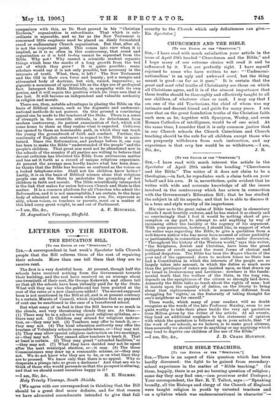[TO THE EDITOR OP THE "SPECTATOR."]
SIR,—I have read with much interest the article in the Spectator of April 28th under the heading "Churchmen and the Bible." The writer of it does not claim to be a theologian,—in fact, he repudiates such a claim both on your behalf and his own. It is, nevertheless, quite evident that he writes with wide and accurate knowledge of all the issues involved in the controversy which has arisen in connection with the Government's Education Bill ; that he has studied the subject in all its aspects; and that he is able to discuss it in a tone and style worthy of its importance.
His view as to the great value of Bible teaching in elementary schools I most heartily endorse, and he has stated it so clearly and so convincingly that I feel it would be nothing short of pre- sumption on my part to attempt to add anything by way of increasing either the lucidity or the cogency of his argument. With your permission, holiever, I should like, in support of what the writer says regarding the Bible, to give a quotation from a well-known author who has never been accused of either partiality or partisanship in connection with the matters under discussion. "Throughout the history of the Western world," says this writer, "the Scriptures, Jewish and Christian, have been the great instigators of revolt against the worst forms of clerical and political despotism. The Bible has been the Magna Charta of the poor and of the oppressed: down to modern times no State has had a Constitution in which the interests of the people are so largely taken into account, in which the duties so much more than the privileges of rulers are insisted upon, as that drawn up for Israel in Deuteronomy and Leviticus : nowhere is the funda- mental truth that the welfare of the State, in the long run, depends on the uprightness of the citizen so strongly laid down. Assuredly the Bible talks no trash about the rights of man: but it insists upon the equality of duties, on the liberty to bring about that righteousness which is somewhat different from struggling for rights,' on the fraternity of taking thought for one's neighbour as for oneself."
These words, which many of your readers will no doubt recognise as the words of the late Professor Huxley, seem to me quite worthy to take their place beside the very apt quotation from Milton given by the writer of the article. At all events, they lend an additional emphasis to the statement of opinion with which the quotation is followed up in your article, that "if the work of our schools, as we believe, is to make good citizens, then assuredly we should never do anything or say anything which may tend to deprive our children of the use of the Bible."










































 Previous page
Previous page